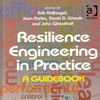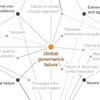 An article today in the paper issue of Dagens Næringsliv, the Norwegian equivalent of the Financial Times or Wall Street Journal, presents a survey among businesses considered to be part of the country’s critical infrastructure, saying that 7 out of 10 businesses do not have a contingency plan in case of ICT failure (Information and Communication Technology). This was a hot issue 10 years ago, when everybody was fearing the transition to Y2K, but since then complacency seems to have taken over. Maybe we take our computers and mobile phones so much for granted that we forget that they could fail?
An article today in the paper issue of Dagens Næringsliv, the Norwegian equivalent of the Financial Times or Wall Street Journal, presents a survey among businesses considered to be part of the country’s critical infrastructure, saying that 7 out of 10 businesses do not have a contingency plan in case of ICT failure (Information and Communication Technology). This was a hot issue 10 years ago, when everybody was fearing the transition to Y2K, but since then complacency seems to have taken over. Maybe we take our computers and mobile phones so much for granted that we forget that they could fail?
A nightmare scenario
You may think, hey, how does ICT-failure link up with supply chain risk? But consider this, how are you going to communicate with your suppliers or customers if there is no Internet connection or no phone lines? How are you going to process orders without a functioning ERP? According to the above survey, which is also cited on e24.no, 80% of the businesses asked said they would be unable to function without Internet or phone lines. Yet, only 30% had made contingency plans or contractual agreements with their ICT suppliers in case of failure.
The survey
The survey was done by the Norwegian Post and Telecommunications Authority (NPT). NPT is an autonomous administrative agency under the Norwegian Ministry of Transport and Communications, with monitoring and regulatory responsibilities for the postal and telecommunications markets in Norway. The survey report (in Norwegian) can be downloaded here: Samfunnskritiske verksemder og avhenga til ekom i krisesituasjonar.
ICT Risk = Supply Chain Risk?
A lot of supply chain risk management focuses on the physical and the relational side of the supply chain, in order to to secure the supply chain itself and the inbound and outbound logistics. ICT is maybe forgotten in all this? I hope not. ICT is an integral part of any supply chain. In my humble opinion, not having an ICT contingency plan show how little businesses understand (or care) about their supply chain.
A victim of cost-cutting?
These days, cost-cutting is receiving much attention. Let’s hope that this cost-cutting does not lead to contingency plan-cutting as well. That could be one cut too many, should the unthinkable occur.
Related
- Dagens it: Syv av ti uten kriseplan
- e24.no: Syv av ti har ikke kriseplan
- Post- og teletilsynet: Samfunnskritiske verksemder er sårbare i krisesituasjonar












